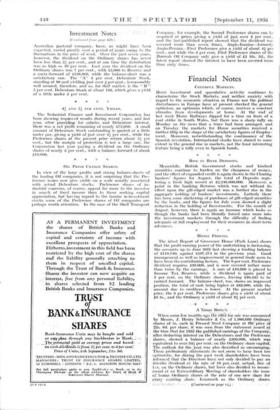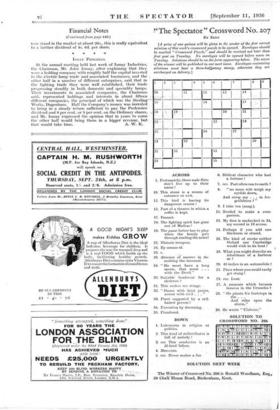Financial Notes
CHEERFUL MARKETS.
Born investment and speculative activity continues to .characterise the Stock Markets; and neither anxiety-with regard to the economic situation in France nor the political disturbances in Europe have at present checked the -general optimism, an optimism which, of course, receives a constant stimulus from developments at home. At the" end of -last week 'Home Railways dipped for a time on fears of a coal strike in South Wales, but there was a sharp rally on Monday on the news that a truce had been arranged, and on Tuesday the markets for Home securities received a -further fillip in the shape of the satisfactory figures of Employ- ment. Moreover, notwithstanding the continuance of the Spanish revolution, International stocks have shared to some extent in the general rise in markets, not the least interesting feature being a rally even in Spanish bonds.
* * * *
RISE IN BANK DEPOSITS.
Meanwhile, British Government stocks and kindred securities continue to harden on the cheapness of money, and the effect of expanded credit is again shown in the Clearing bankers' figures for August, the total of Deposits regis- tering a fresh high record at £2,246,000,000. Moreover, a point in the banking Returns which was not without its effect upon the gilt-edged market was a further rise in the aggregate holding of bankers' investments. Latterly there has been some slackening of purchases of gilt-edged securities by the banks, and the figures for July even showed a slight reduction in the holding of Investments. For the month of August, however, there is again an increase which looks as though the banks had been literally forced once more into the investment markets through the difficulty of finding adequate or full employment for their resources in short-term advances.
HOTEL PROFITS.
The latest Reportt of Grosvenor House(Park Lane) shows that the profit-earning power of the undertaking is increasing, the accounts up to June 30th last showing a trading balance of £119,940, against £107,274 in• the previous year. Good management, as well as improvement in general trade seem to have been the contributing factors. The 6 per cent. Preference dividend requires £30,000, and is now covered rather mare than twice by the earnings: A sum of £10,000 is placed to Income Tax Reserve, while a dividend is again paid Of 5 per'cent. on the Ordinary shares, leaving £40,445' to be carried forward. The balance-sheet, too, shows an improved 'position, the total of cash being higher at £82,000, while the amount due to- creditors is lower. At the present market price, the 6 per cent. Preference shares give a yield of about £6 6s., and the Ordinary a yield of about 64 per cent.
• '' Jr- r When some months ago thetiffer for sale was announ by ced Meisrs...f. Ileniygchroder Ltz' CO: of 1,980,000 Ordinary shares of 5s. each in Pressed Steel Company at flie"price.of 22s. 6d. per share, it was seen from the statement issued at the time that for.19g the publishedeairnings of the Company, after deducting interest on the Debentures and the Preference shares, showed a balince of nearly £200,000, which was equivalent to over 344 per cent. on the Ordinary share capital:: The .9utlook for the year was also described as eicouraging., these- preliminary statements. do uoifieern to have been too, Optimistic, for, during the past week shareholders. have. been informed that t* Directors have not only decided to pay an interim divicienil, at the rate of .10 .per., cent. actual, free of tax, on the Ordinary shares, but have also decided to reconi- Mend at -Ektraordifiary Meeting of shareholders the issue of borMS: Ordinary shares- at the rate of one -new share for every existing share. Inasmuch as the Ordinary shares
* * * , A 'Gimp
Financial Notes
(Continued from page 440.)
now stand in the market at about 28s., this is really equivalent to a further dividend of 4s. 6d. per share.
* * -*
Islay PROGRESS.
At. the annual meeting held last week of Ismay Industries, the Chairman, Mr. John Ismay, after explaining that they were a holding company with roughly half the capital invested in the electric lamp trade and associated businesses, and the other half in a number of different enterprises, said that in the lighting trade they were well established, their trade progressing steadily in both domestic and speciality lamps. Their investments in associated companies, the Chairman said, represented holdings and interests in about fifteen different companies, the principal of which was the Sterling Works, Dagenham. Half the Company's money was invested to bring in a steady return sufficient to pay the Preference dividend and 8 per cent. or 9 per cent. on the Ordinary shares, . and Mr. Ismay- eipkessed the opinion that in years to come the other half would bring them in a bigger revenue, but













































 Previous page
Previous page